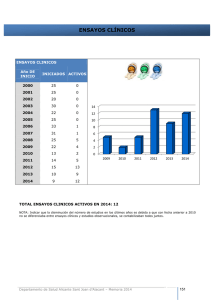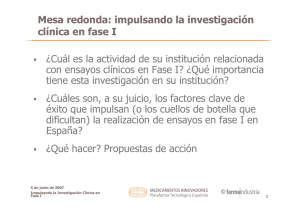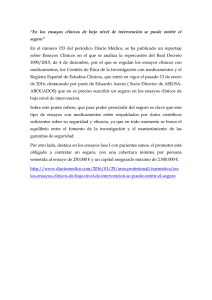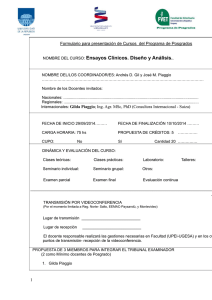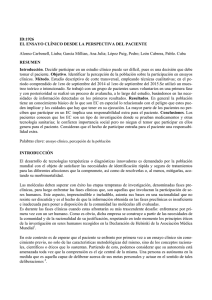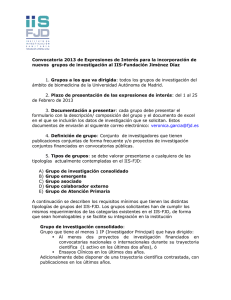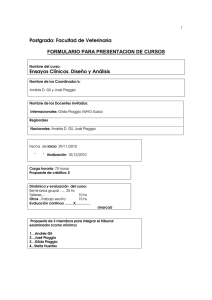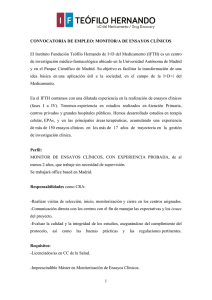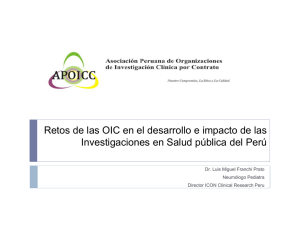Implementación de la iniciativa de registro de ensayos clínicos
Anuncio
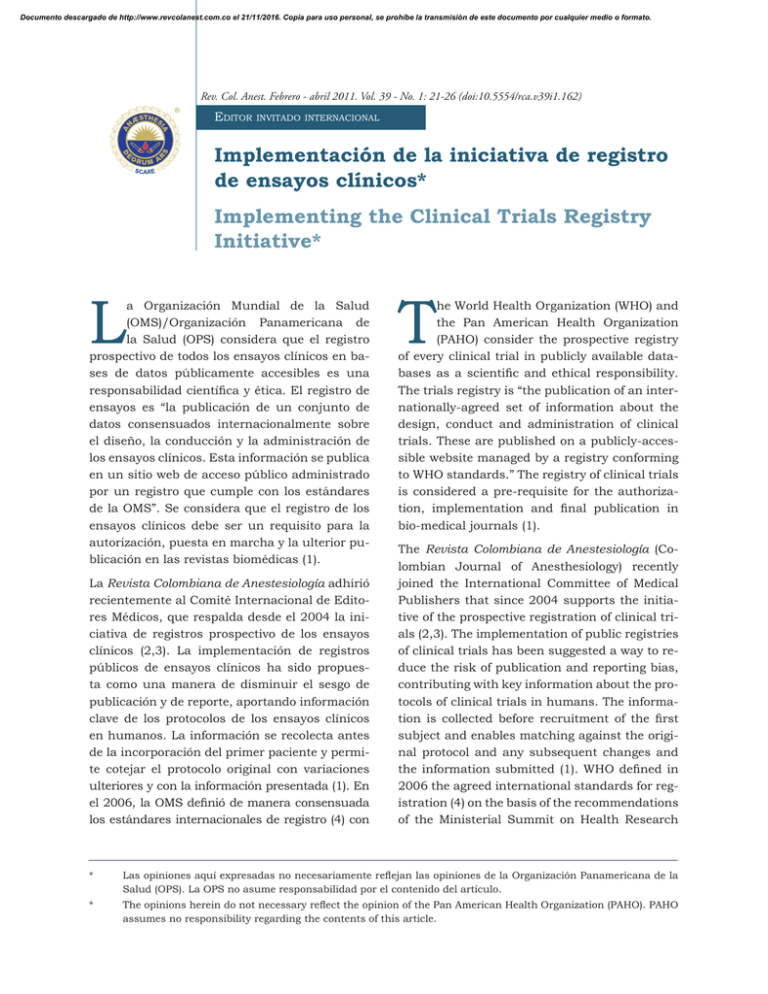
Documento descargado de http://www.revcolanest.com.co el 21/11/2016. Copia para uso personal, se prohíbe la transmisión de este documento por cualquier medio o formato. Rev. Col. Anest. Febrero - abril 2011. Vol. 39 - No. 1: 21-26 (doi:10.5554/rca.v39i1.162) eDitor invitaDo internacional Implementación de la iniciativa de registro de ensayos clínicos* Implementing the Clinical trials Registry Initiative* l a organización Mundial de la Salud (OMS)/Organización Panamericana de la Salud (OPS) considera que el registro prospectivo de todos los ensayos clínicos en bases de datos públicamente accesibles es una responsabilidad cientíica y ética. El registro de ensayos es “la publicación de un conjunto de datos consensuados internacionalmente sobre el diseño, la conducción y la administración de los ensayos clínicos. Esta información se publica en un sitio web de acceso público administrado por un registro que cumple con los estándares de la OMS”. Se considera que el registro de los ensayos clínicos debe ser un requisito para la autorización, puesta en marcha y la ulterior publicación en las revistas biomédicas (1). la Revista Colombiana de Anestesiología adhirió recientemente al Comité Internacional de Editores Médicos, que respalda desde el 2004 la iniciativa de registros prospectivo de los ensayos clínicos (2,3). La implementación de registros públicos de ensayos clínicos ha sido propuesta como una manera de disminuir el sesgo de publicación y de reporte, aportando información clave de los protocolos de los ensayos clínicos en humanos. La información se recolecta antes de la incorporación del primer paciente y permite cotejar el protocolo original con variaciones ulteriores y con la información presentada (1). En el 2006, la OMS deinió de manera consensuada los estándares internacionales de registro (4) con T he World Health Organization (WHO) and the Pan american Health organization (PAHO) consider the prospective registry of every clinical trial in publicly available databases as a scientiic and ethical responsibility. The trials registry is “the publication of an internationally-agreed set of information about the design, conduct and administration of clinical trials. These are published on a publicly-accessible website managed by a registry conforming to WHO standards.” The registry of clinical trials is considered a pre-requisite for the authorization, implementation and inal publication in bio-medical journals (1). The Revista Colombiana de Anestesiología (colombian Journal of Anesthesiology) recently joined the International Committee of Medical Publishers that since 2004 supports the initiative of the prospective registration of clinical trials (2,3). The implementation of public registries of clinical trials has been suggested a way to reduce the risk of publication and reporting bias, contributing with key information about the protocols of clinical trials in humans. The information is collected before recruitment of the irst subject and enables matching against the original protocol and any subsequent changes and the information submitted (1). WHO deined in 2006 the agreed international standards for registration (4) on the basis of the recommendations of the Ministerial Summit on Health research * Las opiniones aquí expresadas no necesariamente relejan las opiniones de la Organización Panamericana de la Salud (OPS). La OPS no asume responsabilidad por el contenido del artículo. * The opinions herein do not necessary relect the opinion of the Pan American Health Organization (PAHO). PAHO assumes no responsibility regarding the contents of this article. Documento descargado de http://www.revcolanest.com.co el 21/11/2016. Copia para uso personal, se prohíbe la transmisión de este documento por cualquier medio o formato. 22 Rev. Col. Anest. Febrero - abril 2011. Vol. 39 - No. 1: 21-26 base en las recomendaciones de la cumbre Ministerial sobre Investigación en Salud, llevada a cabo en México en el 2004 (5), y en la resolución WHA58.34 de la 58ª Asamblea Mundial de la Salud. Posteriormente, la OMS puso en marcha la Plataforma Internacional de Registro de Ensayos Clínicos (ICTRP por sus siglas en ingles; www. who.int/int/ictrp/) con la certiicación de los denominados “registros primarios” (1). Para ser avalados como registros primarios, éstos deben cumplir los criterios especíicos de contenido, calidad, validez, acceso, capacidad técnica y periles administrativos y proveer el número único de identiicación para cada ensayo clínico (un ensayo puede ser registrado en múltiples registros, por lo que se asegura su identiicación inequívoca). Su función primordial es facilitar a los diferentes usuarios el registro, la búsqueda y la detección los EC en todo el mundo. El idioma en que la información debe ser enviada a la ICTRP es el inglés. el registro de ensayos clínicos es también un componente clave de la Política de Investigación para la Salud de la oPS, que busca “fortalecer la gobernanza de la investigación, fomentar las buenas prácticas, realzar los estándares de la investigación, y promover el acceso adecuado y oportuno al conocimiento cientíico” (6). En algunos países (1) se ha regulado el registro de ensayos clínicos (por ejemplo, Estados Unidos, India e Israel), pues es la manera más eicaz para asegurar el registro de los estudios, en contraste con el registro voluntario (7-12). Por ello, se promueve que se reglamente en los países de america latina y el caribe el registro obligatorio de todos los ensayos clínicos en humanos, tanto farmacológicos como no farmacológicos, en un registro que cumpla los estándares recomendados por la OMS/OPS. en algunos países de america latina y el caribe no existe una legislación especíica en relación a los EC, o ésta no cobija la totalidad de ellos, circunscribiéndose, por ejemplo, a EC farmacológicos y de dispositivos. Los EC de intervenciones educativas, psicológicas, quirúrgicas o fase IV no requieren frecuentemente ser presentados ante las agencias regulatorias para su aprobación (13,14). Diversos comités de ética alrededor del mundo (por ejemplo, en Australia, Canadá, Reino Uni- held in Mexico in 2004 (5), and of Resolution WHA58.34 of the 58th World Health Assembly. Later on, WHO implemented the International Clinical Trials Registry Platform (ICTRP; www. who.int/int/ictrp/) with the certiication of the so-called “primary registries” (1). In order to be endorsed as primary registries, these must meet the speciic criteria regarding content, quality, and validity, accessibility, technical capacity and governance and provide the universal trial number for each clinical trial (one trial may be registered in multiple registries; this number ensures its unambiguous identiication). The main purpose of the UTI is to facilitate he search and identiication of CT to users around the world. The information submitted to the ICTRP must be in English. The clinical trials registry is also a key component of PAHO’s Policy on Research for Health that seeks to “strengthen research governance, promote good practices, stress research standards and promote adequate and timely access to scientiic knowledge” (6). Some countries (1) have regulated the clinical trials registry (for instance, the United States, India and Israel), because it is the most eficient way to ensure the registration of studies, as opposed to voluntary registration (7-12). For this reason obligatory registration of all clinical trials in humans – both pharmacological and nonpharmacological - is encouraged in the latin american and caribbean countries, in a registry that meets the standards recommended by WHO/PAHO. Some latin american and caribbean countries do not have a speciic legislation regarding CTs, or the existing legislation is not comprehensive but limited to, for instance, pharmacological CTs and medical devices. Submission to regulatory agencies for approval of clinical trials for educational, psychological, surgical interventions or Phase IV is usually not required (13,14). Various ethics committees around the world (for instance, Australia, Canada, United Kingdom) also require the registration of all CTs before or during their approval (http://www.who.int/ ictrp/trial_reg/en/index2.html). If the ethics Documento descargado de http://www.revcolanest.com.co el 21/11/2016. Copia para uso personal, se prohíbe la transmisión de este documento por cualquier medio o formato. Implementación de la iniciativa de registro de ensayos clínicos Implementing the Clinical Trials Registry Initiative do) exigen, igualmente, el registro de todos los EC antes o durante su aprobación (http://www.who. int/ictrp/trial_reg/en/index2.html). De ser adoptada esta buena práctica por parte de los comités de ética, habrá mayor adherencia a la iniciativa y, en consecuencia, se establecerá un sistema más transparente y beneicioso para los usuarios y productores de los ensayos clínicos. Es fundamental recordar que el documento actualizado de la Declaración de Helsinki, publicado en el 2008, establece que se debe registrar cada ensayo clínico en una base de datos de acceso público antes de reclutar el primer sujeto (15). actualmente, la plataforma de registro de la oMS (ICTRP) tiene registrados más de 125.000 ensayos clínicos y cuenta con 11 registros primarios alrededor del mundo, además del registro de clinicaltrial.gov (www.clinicaltrial.gov) (1). Adicionalmente, el Registro Brasilero (www.ensaiosclinicos.gov.br) y el Registro Público Cubano de Ensayos Clínicos (http://registroclinico.sld.cu/) se han presentado para tener el aval como registros primarios de la red de la ICTRP. En América funcionan otros valiosos registros, como la Base de consultas acerca de los estudios en Farmacología de la administración nacional de Medicamentos, Alimentos y Tecnología Médica, en Argentina (ANMAT; http://www.anmat.gov.ar/ aplicaciones_net/applications/consultas/ensayos_clinicos/principal.asp), el Registro Peruano de Ensayos Clínicos (http://www.ins.gob.pe/ registroec/registroEnsayosclinicos.asp?fpt=1) y Latinrec (www.latinrec.net). Estos no han sido incorporados aún a la red de registros primarios de la ICTRP. Así mismo, algunas agencias regulatorias (por ejemplo, el Invima, en Colombia) proveen información relevante acerca de los ensayos clínicos sometidos a evaluación (16). Existen diversas razones por las que se considera importante que los países cuenten con mecanismos de registro de los ensayos clínicos que cumplan con los estándares recomendados por la oMS y que aporten su información a un repositorio integrador único (la ICTRP) (1,4): • necesidad de garantizar que las decisiones sobre la atención sanitaria sean tomadas con todos los datos cientíicos disponibles. 23 committees were to adopt this good practice, there would be better compliance with the initiative and thus a more transparent and beneicial system for the users and producers of clinical trials. We must not forget that the updated document of the Declaration of Helsinki, published in 2008, establishes that every clinical trial shall be registered in a publicly accessible database before recruiting the irst subject (15). Currently, the WHO registry platform (ICTRP) has registered over 125,000 clinical trials and has 11 primary registries around the world, in addition to the clinicaltrial.gov (www.clinicaltrial.gov) registry (1). Additionally, the Brazilian Registry (www.ensaiosclinicos.gov.br) and the Cuban Public Registry of Clinical Trials (http://registroclinico.sld.cu/) have asked to become primary registries of the ICTRP network. Other valuable registries operate in the americas, such as the Database for consultation about Pharmacological Studies of the national administration of Drugs, Food and Medical Technology in Argentina (ANMAT; http:// www.anmat.gov.ar/aplicaciones_net/applications/consultas/ensayos_clinicos/principal. asp); the Peruvian Registry of Clinical Trials (http://www.ins.gob.pe/registroec/registroEnsayosclinicos.asp?fpt=1) and Latinrec (www. latinrec.net). These have not been yet incorporated into the primary registries network of the ICTRP. Similarly, some regulatory agencies (for example, Invima in Colombia) provide relevant information about the clinical trials submitted for evaluation (16). There are several reasons why it is important that countries have registration mechanisms for clinical trials that meet WHo recommended standards and contribute their information to a single comprehensive depository (ICTRP) (1,4): • There is a need to ensure that decisions about health care are informed by all of the available evidence. • Avoid publication bias and selective reporting. • Maintain the ethical principles in accordance with the Declaration of Helsinki. Documento descargado de http://www.revcolanest.com.co el 21/11/2016. Copia para uso personal, se prohíbe la transmisión de este documento por cualquier medio o formato. 24 Rev. Col. Anest. Febrero - abril 2011. Vol. 39 - No. 1: 21-26 • Eliminar el sesgo de publicación y notiicanotiicación selectiva. • Mantener los principios éticos de acuerdo con la Declaración de Helsinki. • Propiciar la identiicación de ensayos clínicos similares o idénticos, de manera que los investigadores y agentes inanciadores eviten la duplicación innecesaria. • Identiicar Identiicar vacíos o brechas en la investigación clínica. • Favorecer Favorecer la la colaboración colaboración entre entre los los investigainvestigadores, al permitir identiicar estudios en áreas de interés similares o complementarias. • Mejorar la calidad de los ensayos clínicos, al hacer posible la identiicación de problemas potenciales al inicio del proceso de investigación. • Aportar un mejor denominador de los ensayos clínicos en curso y desarrollados. • Improving awareness of similar or identical trials so that researchers and funding agencies avoid unnecessary duplication. • Identifying any gaps in clinical research. • Promote collaboration among researchers to identify trials in which they share similar or complementary interests. • Improve the quality of clinical trials by enabling the identiication of potential problems early in the research process. • Provide a better denominator of the trials currently under way and those already completed. Several options have been considered to implement the initiative of the clinical trials registry in countries with an interest in joining the platform: Diversas alternativas han sido planteadas para implementar la iniciativa de registro de ensayos clínicos en aquellos países interesados en adherir a ella: • Developing national registries linked to WHO Primary Registries Network (for instance, this strategy has been followed by Brazil and Cuba). • Desarrollar registros nacionales vinculados a la red de registros Primarios de la oMS (por ejemplo, esta estrategia ha sido seguida por Brasil y Cuba). • Developing national registries that contribute with the essential information to a regional primary registry endorsed by WHO’s ICTRP. • Desarrollar registros nacionales que aporten los datos esenciales a un registro regional primario avalado por la ICTRP de la OMS. • • Establecer una legislación que exija a los patrocinadores o investigadores que registren los ensayos clínicos de forma que aparezcan relejados en un registro primario (por ejemplo, los ensayos clínicos conducidos en Israel deben ser registrados en clinicaltrials.gov) (1). Establish a legislation requiring sponsors or researchers to register clinical trials so that they are listed in a primary registry (for instance, all clinical trials developed in Israel, must be registered in clinicaltrials. gov) (1). • Establish agreements with any existing registry so that it serves as the regional primary registry. These strategies allow for the publication of the clinical trials developed in the country to be made publicly available in the country’s own language and in English. • Establecer acuerdos con algún registro existente para que sirva de registro primario regional. estas estrategias permiten que los ensayos clínicos llevados a cabo en el país se presenten al público en el idioma del país y en inglés. Terminada la primera década del siglo XXI, es difícil precisar el número y las características de los ensayos clínicos llevados a cabo en colombia durante este periodo. Una búsqueda de ensayos clínicos efectuada en PubMed, utilizando un iltro bibliográico recomendado por la Colabo- At the end of the irst decade of the Twenty First Century, it is dificult to determine exactly the number of clinical trials completed in colombia during this period and their characteristics. a search of clinical trials in PubMed, using a reference ilter recommended by the Cochrane Collaboration (17), identiied 997 relevant ref- Documento descargado de http://www.revcolanest.com.co el 21/11/2016. Copia para uso personal, se prohíbe la transmisión de este documento por cualquier medio o formato. Implementación de la iniciativa de registro de ensayos clínicos Implementing the Clinical Trials Registry Initiative 25 ración Cochrane (17), encontró 997 referencias relevantes durante la última década. La revisión de los títulos y resúmenes de las citas publicadas en los años 2009 y 2010 determinó que de 280 citas, 46 eran ensayos clínicos, y de ellos, apenas 5 (11 %) reportaban haber sido inscritos en un registro prospectivo de ensayos clínicos en el resumen. Estos ensayos son una proporción difícil de precisar, del número total de ensayos clínicos que se llevan a cabo en el país. erences in the course of the last decade . The review of the titles and abstracts of the references published between 2009 and 2010 concluded that of 280 references, 46 were clinical trials and of this number only 5 (11 %) reported in the abstract that the trial was registered in a prospective registry of clinical trials. It is hard to tell the percentage of these trials based on the total number of clinical trials developed in the country. La búsqueda de ensayos clínicos que han sido registrados en el portal de búsqueda de la ICTRP (término clave “Colombia”) identiicó, para la última década, que 423, y de éstos, 137 están reportados como “activos” (diciembre del 2010). Del total, 145 fueron registrados en los años 2009-2010 y 87 de ellos se encuentran actualmente activos. The search of clinical trials that have been registered with the ICTRP portal (key word “Colombia”) identiied a total of 423 trials in the last decade, of which 137 are reported as “active” (December, 2010). 145 from the total of 423 were registered between 2009-2010 and 87 of them are currently active. Una búsqueda similar realizada para el Perú entre el 2000 y el 2009, identiicó 484 ensayos clínicos. Al contrastar estas cifras con los datos de los ensayos clínicos evaluados por parte del Instituto Nacional de Salud, del Ministerio de Salud del Perú (1.086 ensayos clínicos evaluados en ese periodo), se evidencia que la ICTRP identiicó alrededor de la mitad de este número (18). Sin embargo, es de anotar que sólo a partir del 2005 se dio un impulso mayor a la iniciativa de registro a escala mundial. A similar search for Peru between 2000 and 2009 identiied 484 clinical trials. When comparing these igures against the data of the clinical trials assessed by the National Health Institute of the Peruvian Ministry of Health (1,086 evaluated during that period of time), it is evident that the ICTRP identiied about one half of that number (18). It must be noted however, that it was only after 2005 when a stronger emphasis was placed on the registry initiative worldwide. la implementación de la iniciativa de registro de todos los ensayos clínicos en cada país permite promover la transparencia en la investigación y el uso adecuado de las evidencias cientíicas que informan las decisiones en salud. Se promueve, además, la colaboración de los comités de ética y la adopción de regulaciones nacionales concordantes con esta iniciativa. Información adicional y avances de estas iniciativas se encuentran en el sitio www.paho.org/ portalinvestigacion. The implementation of the registry initiative for all clinical trials in each country promotes the transparency of research and the adequate use of the scientiic evidence for informed decisionmaking in health care. It also encourages collaboration among the ethics committees and the approval of national rules consistent with this initiative. For any additional information about these initiatives, please visit www.paho.org/portalinvestigacion. ludovic Reveiz luis gabriel Cuervo Promoción y desarrollo de la investigación, Sistemas de Salud Basados en Atención Primaria de la Salud (HSS). Organización Panamericana de la salud. Washington, Estados Unidos de Norte América. [email protected] Documento descargado de http://www.revcolanest.com.co el 21/11/2016. Copia para uso personal, se prohíbe la transmisión de este documento por cualquier medio o formato. 26 Rev. Col. Anest. Febrero - abril 2011. Vol. 39 - No. 1: 21-26 REfEREnCES 1. Organización Mundial de la Salud. International Clinical Trials Registry Platform (ICTRP) [Internet]. Ginebra: WHO; 2010 [citado 2010 Dic 15]. Disponible en: http://www.who.int/ictrp/es/index.html. 2. DeAngelis C, Drazen JM, Frizelle FA, Haud C, Hoey J, Horton R, et al. Clinical trial registration: a statement from the International Committee of Medical Journal Editors. N Engl J Med. 2004;351(12): 1250-1. 3. De Angelis CD, Drazen JM, Frizelle FA, Haug C, Hoey J, Horton R, et al. Is this clinical trial fully registered? A statement from the International Committee of Medical Journal Editors. Ann Intern Med. 2005;143(2):146-8. 4. World Health Organization. World Health Organization international clinical trials registry platform. New standards for registration of human medical research [Internet]. Geneva: WHO; 2006 [citado 2010 Ene 21]. Disponible en: http://www.who.int/mediacentre/news/releases/2006/pr25/en/ 5. México. Ministerial Summit on Health Research. The Mexico Statement on Health Research. Knowledge for better health: strengthening health systems [Internet]. Mexico: Ministerial Summit on Health Research; 2004 [Citado 2010 Dic 15]. Disponible en: http://www.who.int/rpc/summit/agenda/Mexico_ Statement-English.pdf. 6. Pan American Health Organization. Policy on Research for Health. Washington: OPS; 2009. (Document CD49/10). [citado 2010 Dic 15]. Disponible en: http://new.paho.org/hq/dmdocuments/PolicyResearchHealthENG.pdf 7. Ross JS, Mulvey GK, Hines EM, Nissen SE, Krumholz HM. (2009) Trial publication after registration in clinicaltrials.gov: a cross-sectional analysis. PLoS Med. 6(9):e1000144. 8. Zarin DA, Ide NC, Tse T, Harlan WR, West JC, Lindberg DA. Issues in the registration of clinical trials. JAMA. 2007;297(19):2112-20. 9. Tuma RS. New law may be having some effect on publication bias. J Natl Cancer Inst. 2010;102(5): 290-2. 10. US Department of Health and Human Services, US Food and Drug Administration. FDAAA Implementation Chart [Internet]. Silver Spring: FDA [2010 Dic 15]. Disponible en: http://www.fda.gov/oc/initiatives/advance/fdaaa/implementation_chart.html. 11. Tharyan P. Prospective registration of clinical trials in India: strategies, achievements & challenges. J Evid Based Med. 2009;2(1):19-28. 12. Bian ZX, Wu TX. Legislation for trial registration and data transparency. Trials. 2010;11:64. 13. Lolas F, editor. Dimensiones éticas de las regulaciones en salud. Monografías de ACTA BIOETHICA Nº 3 [Internet]. Santiago de Chile: Centro Interdisciplinario de Estudios en Bioética, Universidad de Chile Programa de Bioética, OPS, OMS; 2009 [Citado 2010 Dic 15] Disponible en: www.paho.org/Spanish/BIO/ regulacion.pdf 14. Ofice for Human Research Protections, U.S. Department of Health and Human Services, compiladores. International Compilation of Human Research Protections 2011 Edition [Internet]. Washington: HHS [citado 2010 Dic 15]. Disponible en: http:// www.hhs.gov/ohrp/international/2011-hspcompilation.pdf 15. World Medical Association. WMA Declaration of Helsinki-Ethical Principles for Medical Research Involving Human Subjects [Internet]. Ferney-Voltaire: WMA. Disponible en: http://www.wma.net/ en/30publications/10policies/b3/index.html. 16. INVIMA. Registro de protocolos de investigación clínica aprobados y rechazados por el INVIMA en el año 2010 [Internet]. Bogotá: INVIMA; 2010. [2010 Dic 15]. Disponible en: http://web.invima.gov.co/ portal/documents/portal/documents/root/PORTAL%20IVC/BUENA%20PRACTICAS%20CLINICAS/ Registro%20de%20Protocolos%20de%20Investigacion%20Clinica/REGISTRO%20DE%20PROTOCOLOS%20DE%20INVESTIGACION%202010.pdf. 17. Higgins JPT, Green S, editores. Cochrane Handbook for Systematic Reviews of Interventions Version 5.0.2 [updated September 2009] [Internet]. The Cochrane Collaboration; 2009 [citado 2010 Dic 15]. Disponible en: www.cochrane-handbook.org. 18. República de Perú. Ministerio de Salud, Instituto Nacional de Salud. Perú: A country of opportunities for clinical research [Internet]. Lima: Ministerio de Salud; 2010 [2010 Dic 15]. Disponible en: http:// www.ins.gob.pe/repositorioaps/0/2/not/not_inves13102010/brochure%20INS_PERU%20version%20inal%20en%20INGL%C3%89S.pdf.
